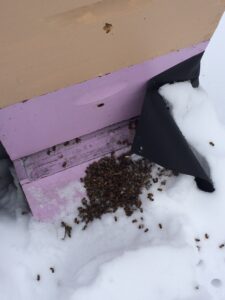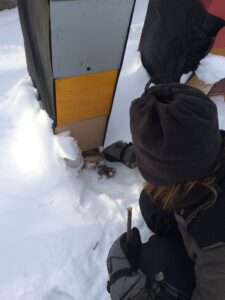
Of the dozen hives I scraped out in the last two days, only four had beyond-countable numbers of dead bees. This hive had the most. Yet, after pressing my ear to the side and rapping sharply on the side, I unmistakably heard a rush of air (wings?) and a low growl. Perhaps they had the most dead bees because they are strongest? Were best-equipped to carry their dead to near the entrance where I could remove them? Have a strong cleaning gene? The bottom line? Lots of dead bees doesn’t mean a dead hive!
I got a panicked text from a first year beekeeper recently when the thermometer (again) read -8 degrees. The text said: “My bees are all right, right?!?”
I answered supportively that of course they are.
And because I don’t text very well, and because there’s a lot of bliss in ignorance, that’s all I texted.
The truthful answer to whether bees are all right when it is 8 below, or actually, anything below about 25 is: they are what they are. You might as well assume they’re fine, because there really isn’t much you can do about it anyway at those temperatures.
As I’ve preached in previous blogs, winter prep needs to occur before winter. At this point, other than putting up a wind break if you didn’t already have one, or wrapping hives if you didn’t already do so (although I’m far from convinced that’s necessary), there really isn’t much you can do. Bees can endure these extreme temperatures for a bit, as long as they were healthy going in to winter, have sufficient numbers to keep the queen warm and move to the food in their hive, and there’s actually food.
Are your bees probably alive? Yes, probably. Most Michigan bees are alive in January. It is toward the end of February or March when most die-offs occur. I’ll explore those reasons more in a later blog.
So what can you do? In these extreme temperatures, really not much other than what I’ve already covered. If we get a 30ish-40ish-50ish degree day and you see bees out flying (albeit perhaps briefly to take a bio-break), you may be able to pop the cover and peek to see if they’ve worked their way to the top. Perhaps you’ll need to add emergency feed.
You should be checking over your hive every few weeks or at least monthly—for reasons like to ensure a branch hasn’t fallen and knocked into them, to say hello to them, and to clear snow from the entrance.
When you’ve cleared the entrance, it is also a great time to scrape out any dead bees. They’re impeding air flow. And, when it warms up, those dead bees are going to rot. Removing that decay and moisture from the hive has got to be healthier for the living bees. I temporarily remove the entrance reducer and use a long stick to scrape bees out the front entrance of my Langstroth hives, a different stick for each so as to not spread disease (if there is any in the hive. Got lots of sticks).

My beekeeper daughter, having opened most of the front entrance of a nuc hive, scrapes out dead bees.
You may be astonished how many bees you scrape out … like cups of them. That could be perfectly normal—depending upon how many bees you started with, how often you scrap them out, the type of bee, to name a few. Or, it might mean that the colony has died. Regardless, it is what it is. They’re either alive or not, they either have enough bees to make it or they don’t. Not much you can do about it now.
Should I hear them if they’re alive? Many folks suggest rapping on the hive throughout the winter, and if you hear a low roar, you know they’re alive. Hearing that is reassuring.
But what if you don’t hear them? It might not mean they’re dead—they could just be really hunkered down (or you could be losing your hearing.) If week after week, knock after knock, you hear nothing, probably the colony died. But again, there isn’t much you can do about it at this time. Moving that hive now with rupture the frozen wax. You may want to figure out if and how you’re going to replace them though. Bee suppliers sell out early.
And again, hearing nothing doesn’t mean they’re dead. Last year we’d written off a hive after repeated silent knockings, convinced they were dead. When we could finally get the SUV to them (April!) I opened them up and found hundreds of dead bees and a real mess. I loaded it all in the SUV, putting the top cover to the side so the hive could begin airing out.
By the time I got home, the seven bees and queen that were still alive were standing atop the frames, with a “what are you doing??!!” look in their multiple eyes. I had the same look in my eyes. And I began apologizing profusely. The poor dears had survived the horrific winter and I’d written them off and basically hauled them to the mortuary. I quickly put them in a nuc (a smaller hive box), surrounded them with honey and sugar syrup, and fell on my knees begging both forgiveness and in awe as they’d just survived a winter that killed most of their kind.
Anything else you should be doing? Try not to worry, dream about next season, and check out beekeeper Sheldon’s excellent blog on other things to do while you’re missing your bees on the blog section of kalamazoobeeclub.com.
